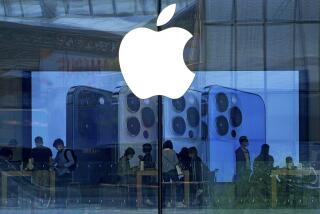âFortniteâ publisher debuts mobile storefront after years in court

Epic Games Inc. is launching a new mobile storefront Friday after four years of legal wrangling with Apple Inc. and Alphabet Inc.âs Google over their app store practices.
Chief Executive Tim Sweeney expects Epic Gamesâ mobile versions of the popular titles âFortnite,â âRocket Leagueâ and âFall Guysâ to draw in gamers on Android devices worldwide and iOS products in the European Union. By the end of the year, the company wants to attract 100 million new installs on mobile devices, which are responsible for half of the $188-billion games market.
In a news conference, Sweeney cited major challenges to that goal, including an installation process on iOS devices that he said was designed to discourage users.
âOnce you go through the 15 horrible steps to get the store on your device, it works really nicely,â he said of the process confronting users.
Epic Games has spent âhundreds of millions of dollarsâ battling Apple and Google over their app store practices, Sweeney said. The tech giants charge companies up to a 30% fee on sales and make it tough for consumers to access and download apps from alternative stores. Sweeney said itâs âworth paying for freedom,â adding that the âentire games industry is in a suppressed state compared to what it would be if there was free and open competition among stores.â
Epic may have lost up to $1 billion in revenue after âFortniteâ was removed from Appleâs App Store, Sweeney said â a step the iPhone maker took when Epic attempted to circumvent the 30% fee with its own storefront in 2020. Epic won an unfair competition case against Google but mostly lost its challenge to Apple. The game company will charge a 12% fee on mobile transactions it processes, as it does with its current store for PCs and Macs.
Recent regulatory moves in the EU are opening up the app store market. But in conversations with other game companies, Epic Games store head Steve Allison said companies offering their apps outside the Apple universe are worried about so-called friction â cumbersome steps to complete a transaction â citing recent moves by that company.
âWe are confident that over time we will get these things eradicated,â Allison said, âbut we donât know if itâs going to be two months or two years or longer.â
Mobile had been the fastest-growing segment in gaming, but worldwide downloads in the second quarter were down 6% from a year earlier to the lowest level since before the COVID-19 pandemic, according to an August report from SensorTower.
Despite the headwinds, game developers are interested in sidestepping Appleâs and Googleâs fees with alternative stores. Microsoft Corp. is making its own web-based mobile store that will offer discounts on items purchased in games such as âCandy Crush.â Epic is also working with third-party mobile app stores such as AltStore to launch games on mobile.
Epic will draw mobile players with a changing roster of free games, which it already offers in the Epic Games Store. Sweeney said the company doesnât plan to adopt a subscription model for its games.
âWe donât need Game Pass,â he said, referring to Microsoftâs offering. âWe donât need people to pay us. Weâre happy to get the users in and have them become long-term customers.â
Offering free games is a cheaper way to acquire users than through ads on social media and results in an upsurge in developersâ game sales, Sweeney said.
In December, the Epic Games Store will welcome third-party game developers. In early 2025, the company hopes to let iOS and Android users access Epicâs self-publishing tools.
DâAnastasio writes for Bloomberg.
More to Read
Inside the business of entertainment
The Wide Shot brings you news, analysis and insights on everything from streaming wars to production â and what it all means for the future.
You may occasionally receive promotional content from the Los Angeles Times.










